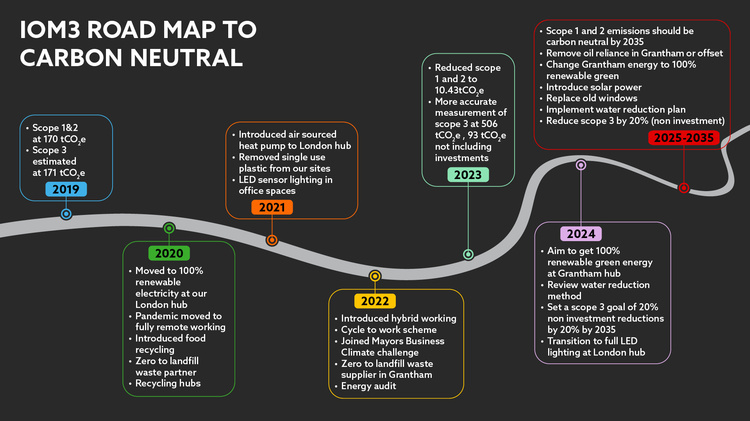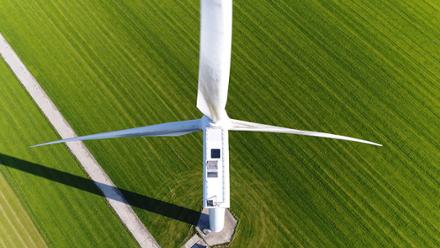Sustainability
IOM3 works to support professionals in materials, minerals, and mining to be champions of the transition to a low-carbon, resource-efficient society.
Principles
IOM3 is guided by its commitment to the 17 United Nations Sustainable Development Goals (UN SDGs), to champion them to our members and stakeholders, and to operate by them as an organisation throughout our business operation.
Our scope and commitment
IOM3 facilitates and promotes scientific progress on subjects which relate to the materials cycle, from the extraction of raw materials, the production processes to make useable materials, the resulting products and applications, and the fate of materials at end-of-life. IOM3 will be an advocate for the use of technologies and materials that have been shown to reduce energy consumption, reduce emissions of greenhouse gases (GHGs) and to minimise waste and pollution. IOM3 will actively challenge misinformation and misconceptions about materials and processes that arise from either prejudice, vested interests, fake news, or poor science, whenever it can.
We are committed to understand the contribution of the materials cycle towards the 17 UN SDGs and to identify and promote where and how improvements can be made. We recognise the inter-dependency of the goals and we set out to apply life-cycle-thinking in our analysis of the social, environmental, and economic outcomes relating to technical developments and strategies across the materials cycle.
IOM3 has signed the Pledge to Net Zero and set itself a science-based target to reduce its Scope 1 and 2 GHG emissions in line with a 1.5°C scenario for global average temperature change and aims to reach net-zero GHG emissions well before 2050. IOM3 has also joined the SME Climate Hub.
Progress
Since 2020 IOM3 has made significant steps forward in reducing its carbon output and in 2024 reduced its scope 1 and 2 emissions to 14.3tCO2e, which is a reduction of just over 91% on its baseline emissions of 170 tCO2e in 2019. IOM3 continues to purchase 100 renewable energy where possible and during 2025 will be reviewing ways to reduce energy use through further infrastructure improvements.
IOM3 set its Scope 3 baseline year in 2023 with emissions 506 tCO2e in 2023 including investments, and 93 tCO2e excluding investments. Just under 9.8tCO2e of our scope 3 emissions (93tCO2e) relates to air travel. Whilst IOM3 only travels by air when absolutely necessary, and encourages the use of public transport, international travel is sometimes an unavoidable part of business as a global organisation. IOM3 offset its emissions related to air travel and for transparency include this figure in our overall carbon reporting. In line with good practice, we commit to an absolute reduction in our overall scope 3 emissions. Because of the complexity of managing our investment-related scope 3 emissions in the context of charity law, we are not currently setting a numerical reduction target for that element beyond an absolute reduction by 2035. For the remaining 93 tCO2e IOM3 is committed to a 20% reduction by 2035.
During 2024 IOM3 continued to expand the reporting of our scope 3 output and working with our suppliers some of which have improved reporting and data available. 2024 emissions were 247.3 tCO2e including investments, and 86.13 tCO2e excluding investments. Just under 1.14tCO2e of our scope 3 emissions (86.13tCO2e) relates to air travel. This is a reduction of just under 7% on our non-investment related emission. Our plans for 2025 reporting include measuring delegate travel, working closely with our journal partner to provide more detailed information for 2025 and looking at ways to reduce water usage.
How did we achieve this?
Carbon & air quality
- Removed gas reliance and moved to resource efficient, low carbon, air sourced heat pump at our London headquarters.
- Purchased green energy.
Resource efficiency
- Introduced food waste recycling.
- Removed single use plastics and coffee cups from our buildings.
- Zero to landfill waste suppliers and increasing recycling hubs.
- Use of eco banners for our single event banners.
- Donation of unwanted furniture to new businesses and communities including the Millwall Community Trust, which works to provide sporting, education, social and healthy lifestyle opportunities for the local community in Southwark, Lewisham and the wider community. Its work is targeted at people of all ages irrespective of race, gender or sexual orientation and it runs workshops aimed at tackling social exclusion, racism, knife crime, lack of employment opportunities for young people, along with mental health and disability issues.
People
- Rationalised physical office space from four sites to two.
- Introduced hybrid working.
- Sustainability education for our team.
- Provide everyone in our team with at least the living wage including our contractors.
Our London hub is also part of the Mayor's Business Climate Challenge.
View the IOM3 Sustainability Policy
View the IOM3 Sustainability Strategy



